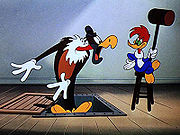
Wet Blanket Policy
Encyclopedia
Wet Blanket Policy is the 29th animated cartoon
short subject
in the Woody Woodpecker
series. Released theatrically on August 20, 1948, the film was produced by Walter Lantz Productions and distributed by United Artists
. The title is a play-on-words about a type of insurance policy.
 Confidence man
Confidence man
Buzz Buzzard
(Lionel Stander
) is looking for a fresh sucker to swindle. Looking off in the distance, Buzz sees a happy-go-lucky Woody Woodpecker (Ben Hardaway
), minding his own business while whistling down the street. The cunning buzzard quickly assembles a makeshift insurance office and greases the sidewalk, causing Woody to slide directly through the front door. He then tries to convince Woody that he needs an insurance policy. Buzz tells Woody that "One never knows when a little accident might prove fatal." Woody is then bamboozled into signing a policy; with the fine print clearly stating that it will pay Buzz $10,000 in case of "accidental" death. However, Woody soon realizes what's going on and challenges him to try to carry out his plan, mocking him by saying "If you think you're going to bump ME off...you're crazy! Anytime you can get $10,000 from me, it'll be over my dead body, you dirty crook!" Buzz then tries his best to kill Woody so he can collect, resulting in a battle of wits between them, only to have the tables turned on him when Woody knocks him into a pit full of alligators. As Buzz flees from his attackers (Woody and the gators), screaming into the distance, Woody laughs and tears up the policy.
and Ramey Idriess
, the song was performed by Kay Kyser
, with Gloria Wood providing vocals and Harry Babbitt
chiming in with Woody's trademark laugh. The song was a smash hit, selling over 250,000 records within ten days of its release. Cashing in on the unexpected popularity, Walter Lantz
hastily inserted the tune into Wet Blanket Policy, his latest film in production as the time (which explains why the action and music do not match up for the first minute of the film). As a result of including "The Woody Woodpecker Song" in Wet Blanket Policy, the song became the first and only tune from an animated short subject to be nominated for the Academy Award for Best Original Song
. Lantz adopted the song as Woody's theme music from then on.
Secondly, Wet Blanket Policy prominently featured Woody's new adversary, Buzz Buzzard. Buzz proved to be a more popular foil for Woody than Wally Walrus
, who appeared less frequently in Woody cartoons after this film. Buzz would appear with the famous woodpecker steadily until 1955's Bunco Busters
, when he was replaced by Dapper Denver Dooley. Dooley would stay on board until 1959's The Tee Bird
; Buzz would only reappear ten years after Dooley's final appearance, in 1969's Tumble Weed Greed.
Lionel Stander
provided the voice of Buzz Buzzard for his earliest appearances. When Stander was blacklist
ed in 1951, Dal McKennon
stepped in as Buzz as well as Wally and Dooley.
Animated cartoon
An animated cartoon is a short, hand-drawn film for the cinema, television or computer screen, featuring some kind of story or plot...
short subject
Short subject
A short film is any film not long enough to be considered a feature film. No consensus exists as to where that boundary is drawn: the Academy of Motion Picture Arts and Sciences defines a short film as "an original motion picture that has a running time of 40 minutes or less, including all...
in the Woody Woodpecker
Woody Woodpecker
Woody Woodpecker is an animated cartoon character, an anthropomorphic acorn woodpecker who appeared in theatrical short films produced by the Walter Lantz animation studio and distributed by Universal Pictures...
series. Released theatrically on August 20, 1948, the film was produced by Walter Lantz Productions and distributed by United Artists
United Artists
United Artists Corporation is an American film studio. The original studio of that name was founded in 1919 by D. W. Griffith, Charles Chaplin, Mary Pickford and Douglas Fairbanks....
. The title is a play-on-words about a type of insurance policy.
Plot

Confidence trick
A confidence trick is an attempt to defraud a person or group by gaining their confidence. A confidence artist is an individual working alone or in concert with others who exploits characteristics of the human psyche such as dishonesty and honesty, vanity, compassion, credulity, irresponsibility,...
Buzz Buzzard
Buzz Buzzard
Buzz Buzzard is a fictional animated cartoon character who appeared in several films produced by Walter Lantz Productions in the 1940s, '50s, and 70’s.-History:...
(Lionel Stander
Lionel Stander
Lionel Jay Stander was an American actor in films, radio, theater and television.-Early life and career:Lionel Stander was born in The Bronx, New York, to Russian Jewish immigrants, the first of three children...
) is looking for a fresh sucker to swindle. Looking off in the distance, Buzz sees a happy-go-lucky Woody Woodpecker (Ben Hardaway
Ben Hardaway
Joseph Benson "Ben/Bugs" Hardaway was a storyboard artist, animator, voice actor, gagman, writer, and director for several American animation studios during the The Golden Age of Hollywood animation. He was sometimes credited as J.B. Hardaway, Ben Hardaway, Buggsy Hardaway, and B. Hardaway.While...
), minding his own business while whistling down the street. The cunning buzzard quickly assembles a makeshift insurance office and greases the sidewalk, causing Woody to slide directly through the front door. He then tries to convince Woody that he needs an insurance policy. Buzz tells Woody that "One never knows when a little accident might prove fatal." Woody is then bamboozled into signing a policy; with the fine print clearly stating that it will pay Buzz $10,000 in case of "accidental" death. However, Woody soon realizes what's going on and challenges him to try to carry out his plan, mocking him by saying "If you think you're going to bump ME off...you're crazy! Anytime you can get $10,000 from me, it'll be over my dead body, you dirty crook!" Buzz then tries his best to kill Woody so he can collect, resulting in a battle of wits between them, only to have the tables turned on him when Woody knocks him into a pit full of alligators. As Buzz flees from his attackers (Woody and the gators), screaming into the distance, Woody laughs and tears up the policy.
"The Woody Woodpecker Song" and Buzz Buzzard
Wet Blanket Policy is notable for several debuts. First, the film was the first appearance of Woody Woodpecker's theme song, "The Woody Woodpecker Song." Written by George TibblesGeorge Tibbles
George Tibbles was a screenwriter, contributing to TV series such as Leave it to Beaver, Date with the Angels, The Munsters, Alice, Family Affair and Who's the Boss?...
and Ramey Idriess
Ramey Idriess
Ramey Idriss was an American songwriter, author, composer and musician, educated at Los Angeles Community College.His birth name was Ramez Idriss but he was also known as Ramey....
, the song was performed by Kay Kyser
Kay Kyser
James Kern Kyser was a popular bandleader and radio personality of the 1930s and 1940s.-Early years:He was born in Rocky Mount, North Carolina, the son of pharmacists Paul Bynum Kyser and Emily Royster Kyser. Editor Vermont C. Royster was his cousin...
, with Gloria Wood providing vocals and Harry Babbitt
Harry Babbitt
Harry Babbitt was an American singer and star during the Big Band era. Born in St. Louis, Missouri, he joined the Kay Kyser band in 1938. With Kyser he recorded several hits in his rich baritone...
chiming in with Woody's trademark laugh. The song was a smash hit, selling over 250,000 records within ten days of its release. Cashing in on the unexpected popularity, Walter Lantz
Walter Lantz
Walter Benjamin Lantz was an American cartoonist, animator, film producer, and director, best known for founding Walter Lantz Productions and creating Woody Woodpecker.-Early years and start in animation:...
hastily inserted the tune into Wet Blanket Policy, his latest film in production as the time (which explains why the action and music do not match up for the first minute of the film). As a result of including "The Woody Woodpecker Song" in Wet Blanket Policy, the song became the first and only tune from an animated short subject to be nominated for the Academy Award for Best Original Song
Academy Award for Best Original Song
The Academy Award for Best Original Song is one of the awards given annually to people working in the motion picture industry by the Academy of Motion Picture Arts and Sciences . It is presented to the songwriters who have composed the best original song written specifically for a film...
. Lantz adopted the song as Woody's theme music from then on.
Secondly, Wet Blanket Policy prominently featured Woody's new adversary, Buzz Buzzard. Buzz proved to be a more popular foil for Woody than Wally Walrus
Wally Walrus
Wally Walrus is a fictional animated cartoon character who appeared in several films produced by Walter Lantz Productions in the 1940s and '50s....
, who appeared less frequently in Woody cartoons after this film. Buzz would appear with the famous woodpecker steadily until 1955's Bunco Busters
Bunco Busters
Bunco Busters is the 64th animated cartoon short subject in the Woody Woodpecker series. Released theatrically on November 21, 1955, the film was produced by Walter Lantz Productions and distributed by Universal International.-Plot:...
, when he was replaced by Dapper Denver Dooley. Dooley would stay on board until 1959's The Tee Bird
The Tee Bird
The Tee Bird is the 93rd animated cartoon short subject in the Woody Woodpecker series. Released theatrically on August 10, 1959, the film was produced by Walter Lantz Productions and distributed by Universal International.-Notes:...
; Buzz would only reappear ten years after Dooley's final appearance, in 1969's Tumble Weed Greed.
Lionel Stander
Lionel Stander
Lionel Jay Stander was an American actor in films, radio, theater and television.-Early life and career:Lionel Stander was born in The Bronx, New York, to Russian Jewish immigrants, the first of three children...
provided the voice of Buzz Buzzard for his earliest appearances. When Stander was blacklist
Blacklist
A blacklist is a list or register of entities who, for one reason or another, are being denied a particular privilege, service, mobility, access or recognition. As a verb, to blacklist can mean to deny someone work in a particular field, or to ostracize a person from a certain social circle...
ed in 1951, Dal McKennon
Dallas McKennon
Dallas Raymond McKennon , sometimes credited as Dal McKennon, was an American actor, with extensive work as a voice actor, in a career lasting over 50 years.-Career:...
stepped in as Buzz as well as Wally and Dooley.

